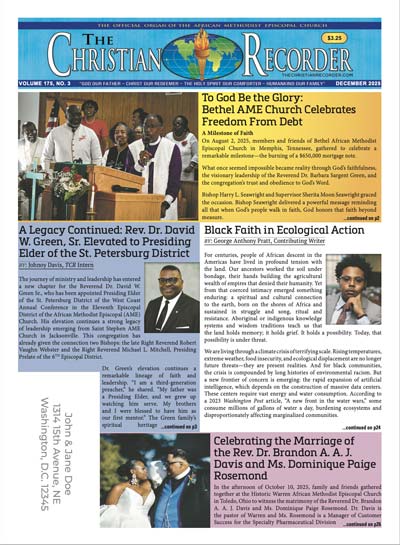TCR Staff Report
On May 29, the General Board of the African Methodist Episcopal Church met via Zoom Conference Call under the leadership of Bishop Gregory G. M. Ingram (president of the General Board) and Bishop Harry L. Seawright. (president of the Council of Bishops), the members of the General Board gathered to address the budgetary implications of the novel coronavirus COVID-19 pandemic on the Connectional Church.
Bishop Ingram called the meeting to order shortly after 1pm Eastern Time. Prayer was given by Presiding Elder Jocelyn Lovelace Hart of the First Episcopal District. Bishop Seawright greeted the Board and emphasized that in the wake of the COVID-19 pandemic as well as racism evidenced by the killing of George Floyd by Minneapolis police officers prayer was needed more than ever. Senior Bishop Adam J. Richardson also greeted the assembly and thanked the members of the Board for their service and reminded them to remain ever vigilant as we seek to protect the health of our communities through masks and frequent handwashing. He highlighted that the United States had reached 100,000 pandemic fatalities and that this was a season of mourning and prayer.
After the approval of the agenda, the meeting was turned over to Bishop Clement W. Fugh, Chair of the Statistics and Finance Commission. Bishop Fugh gave a summary of the Commission’s work and indicated that the proposal for consideration was a one-year budget from August 1, 2020, to July 31, 2021, with a cut of 25% lowering the annual budget from $14,371,890 to $10,788,426. Cuts to line items ranged from 25-100% except for retired bishops and general officers, episcopal widows and widower, and the salaries of bishops in Districts 14-20. The 25% figure amounts to the elimination of one quarterly connectional payment spread throughout the budget year. (Episcopal Districts pay their share of the connectional budget once a quarter). Bishop Fugh noted that the Connectional Church was trying to be sensitive to the economic effects of the pandemic on our members and congregations while at the same time acknowledging the strain that the cuts would cause.
Discussion ensued among the Board members and several Connectional department and organization heads about impacts, sources of revenue, disproportionate impact on ministries, and the AME Church Future Fund. Treasurer/CFO Dr. Richard Allen Lewis indicated that the AME Church Finance Department had applied for the Payroll Protection Program (PPP) along with other stimulus funds, yet the amount to be received was not yet known. He also advised against using the existing reserves or the Future Fund to shore up current expenses. One notable part of the discussion occurred when Connectional Council President Reverend Leodis Strong volunteered $1000 from the Connectional Council Budget to the Health Commission to partially restore their cut for the budget year.
No attempts were made to amend the budget during the discussion, and it proceeded towards a vote. Due to General Board procedures, a three-quarters (75 percent) vote was needed for its approval. The budget was approved by 78.4 percent to 21.6 percent.* There was a point of order initiated by Bishop Jeffery Leath regarding voting procedures and secret ballots for persons who were on the telephone and unable to access the voting screen. After General Secretary/CIO Rev. Dr. Jeffery Cooper explained the email voting procedure, Bishop Ingram ruled that the vote stood, and the budget was approved. It will be forwarded to the Council of Bishops where it must receive the two-thirds concurrence of the active bishops to be adopted.
After the budget vote, Bishop Samuel Green raised three questions: 1) the need for Episcopal Districts to cut their budgets by one-quarter; 2) submission of requests to raise additional funds for AME schools and Episcopal District projects; 3) review of Episcopal District audits.** Bishop Fugh stated that he would defer to the General Board to give guidance on Episcopal District Budget reductions and that the Statistics and Finance Commission would review additional appeals and Episcopal District audits later in the month. Bishop Green indicated that he had already implemented a one-quarter cut in his Episcopal District budget and had encouraged his Presiding Elders to do the same with their budgets. Bishop Ingram echoed the same belief that Episcopal District budgets should be cut.
Rev. Dr. Roderick Belin gave a presentation on the virtual groundbreaking for the AME Church Publishing House at 900 13th Avenue South, Nashville, Tennessee on June 1, 2020, at 9 am Central. Persons interested may view the program via the AME Church Publishing House’s Facebook Page.
A concern by Presiding Elder Ronald Braxton (2nd District) was raised regarding the funding of AME schools due to the budget cuts specifically addressing if the monies already donated for the General Conference HBCU night could be distributed to the AME schools. General Conference Program Chair Bishop Vashti M. McKenzie indicated that while the corporate contributions should be reserved for the General Conference out of respect for our sponsors, that the pre-offerings from the Episcopal Districts could be disbursed with the permission of the General Conference Commission. A motion was made and approved to refer the request to them.
Bishop Seawright indicated that there will be a Council of Bishops Pentecost Prayer Call on June 7. Bishop Ingram calling for the Nominating Committee to deal with the 2020-2022 executive slate for the General Board within 30 days. He also indicated that the First Episcopal District had been hit hardest by the coronavirus and a 400 page book chronicling the ministry during the pandemic had been created.
Bishop Anne Henning Byfield gave the closing prayer at approximately 3:05pm.
*Only the percentage totals were displayed on the screen. A quorum to conduct business was declared by the President of the General Board at the beginning of the call.
**According to page 207 of the 2016 Book of Discipline, “The Episcopal District Budget shall not exceed thirty-five percent (35%) of the episcopal district allocation of the connectional budget, except in episcopal districts where the episcopal district budget allocation does not exceed $500,000….Episcopal districts with schools and other projects may appeal to the General Board for special funding consideration.”






